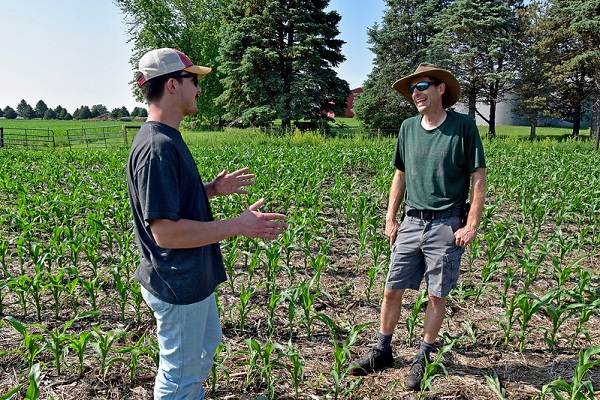(Des Moines, Iowa; USDA News) — USDA’s Natural Resources Conservation Service (NRCS) obligated a record $85.8 million in conservation practice funding to Iowa farmers in fiscal year 2023, through 1,628 conservation program contracts that will help treat natural resource concerns such as soil erosion and water quality on 386,736 acres. Conservation program contracts typically run three to five years, depending on the program. The obligated funds are nearly $3 million more than the prior record of $83 million in fiscal year 2021, and $16 million more than the prior five-year average.
IRA Funding
NRCS State Conservationist Jon Hubbert says a major reason for the increase in conservation funding is the Inflation Reduction Act (IRA), which helped NRCS provide $18.6 million to Iowa farmers in 2023. Hubbert says the IRA offers unprecedented funding for several existing programs. “We are using IRA funds to provide direct climate mitigation benefits to Iowa landowners and expanding access to NRCS assistance to increase conservation on Iowa’s private lands,” he said.
IRA funding is targeted to support climate-smart agriculture mitigation and help farmers build resilience in their operations. Examples of eligible practices include cover crops, no-till farming, nutrient management, prescribed grazing, and tree planting. “Many of the conservation efforts Iowa producers are adopting through IRA offer stacked benefits,” said Hubbert. “They are also benefitting soil health, water quality, wildlife habitat and protecting other resource concerns.”
Hubbert says IRA funding will increase over the next few years. “This is a great opportunity for Iowa landowners to address resource concerns on their farms,” he said. “The support for voluntary conservation at the local and national level has never been greater.”

WelchBakehouse – Iowa farmers like Jon Bakehouse (right) of Mills County are utilizing USDA-NRCS conservation programs to diversify their operations while simultaneously protecting and enhancing their natural resources, such as soil health, water quality and wildlife habitat.
Program Breakdown
NRCS provides conservation funding through four primary programs authorized through the Farm Bill: Conservation Stewardship Program (CSP), Environmental Quality Incentives Program (EQIP), Agricultural Conservation Easement Program (ACEP), and Regional Conservation Partnership Program (RCPP).
Conservation Stewardship Program (CSP): CSP helps farmers build a customized plan to meet their conservation goals and needs. Iowa NRCS obligated about $22.2 million through new and renewed CSP contracts during the past year to 557 Iowa landowners who signed five-year CSP contracts to treat natural resource concerns on their land. The CSP contracts will cover 267,103 acres.
Statewide leaders in CSP:
- Jackson County led the state with 33 CSP contracts, totaling 13,443 acres, with an obligation of $961,870.
- Winneshiek County was next with 28 contracts, covering 6,637 acres and an obligation of $612,449.
- Clayton County had the third most contracts with 25, covering 4,323 acres, obligating $518,590.
Environmental Quality Incentives Program (EQIP): NRCS contracted about 45 percent of new federal conservation funding in Iowa through EQIP – a voluntary program that promotes agricultural production and environmental quality, where farmers can choose from a conservation practice list developed at the county level to treat local resource issues. Through EQIP, NRCS obligated $39.1 million covering 93,717 acres through 840 contracts. For the second consecutive year, cover crops, brush management, prescribed grazing, and no-till were the most adopted practices by Iowa farmers.
Statewide EQIP highlights:
- Through the IRA Soil Health Initiative, Iowa NRCS obligated $3.86 million for cover crops on 16,658 acres through 59 contracts.
- Through the Northern Bobwhite Quail Initiative, Iowa NRCS obligated $143,285 in 35 southern Iowa counties by implementing practices like conservation cover, brush management, and tree and shrub establishment to benefit the northern bobwhite quail and other wildlife.
- Through Source Water Protection (SWP), Iowa NRCS staff obligated $2.5 million for select practices that address groundwater and surface water source protection. The 30 new contracts will help protect source water on nearly 9,000 acres.
Regional Conservation Partnership Program (RCPP): Iowa NRCS provided more than $10.5 million to Iowa farmers in 2023 through RCPP projects that will help treat natural resource concerns on more than 24,000 acres. NRCS assisted producers through eight RCPP partnership agreements and 207 contracts. RCPP promotes coordination between NRCS and its partners through agreements and program contracts. The eight RCPP projects in Iowa focus primarily on improving water quality and soil health.
Easements: Through ACEP, NRCS helps landowners, land trusts, and other entities protect, restore, and enhance wetlands, grasslands, and working farms through conservation easements. Overall, there are 1,722 conservation easements in Iowa covering 198,407 acres. During fiscal year 2023, Iowa NRCS obligated $14 million by helping landowners to place agricultural land into 12 new conservation easements. They include:
- IRA-Wetland Reserve Easements: Six landowners contracted with NRCS to place 892 acres into new wetland easements through IRA. NRCS paid $9.6 million for land acquisition and restoration on those six easements.
- ACEP-Wetland Reserve Easements: Four landowners contracted with NRCS to place 339 acres into new wetland easements through ACEP. NRCS paid $4.1 million for land acquisition and restoration for the four easements.
- ACEP-Agricultural Land Easements: Two Iowa producers enrolled their farms into easements to protect the agricultural use and conservation values of their working farms. The easement area for the two farms is 375 acres, totaling $243,000.
Iowa NRCS staff also obligated $13.7 million to historically underserved producers through 278 contracts, covering 30,295 acres. Historically underserved producers include beginning farmers, military veterans, limited resource producers, and socially disadvantaged farmers. NRCS staff wrote 12,753 conservation plans during fiscal year 2023, which covers more than one million acres. Conservation plans help producers target and address natural resource concerns such as soil erosion, water quality, and wildlife habitat, in addition to addressing climate change and improving soil health.
For more detailed Iowa NRCS program results and information, go to https://www.nrcs.usda.gov/sites/default/files/2023-11/2023At-A-Glance.pdf.





